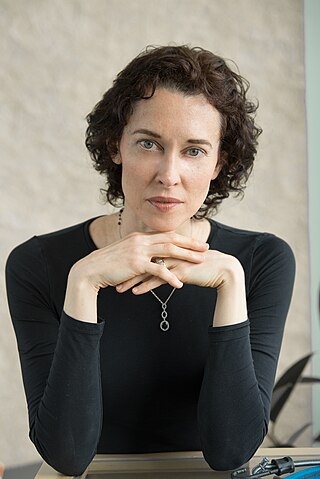Related Research Articles
The Harvard–MIT Program in Health Sciences and Technology, or HST, is one of the oldest and largest biomedical engineering and physician-scientist training programs in the United States. It was founded in 1970 and is the longest-standing collaboration between Harvard University and the Massachusetts Institute of Technology (MIT). Within the program, graduate and medical students are registered with both MIT and Harvard and may work with faculty and affiliated faculty members from both communities. HST is a part of MIT's Institute for Medical Engineering and Science and forms the London Society at Harvard Medical School.
Mehmet Toner is a Turkish biomedical engineer. He is currently the Helen Andrus Benedict Professor of Surgery at Massachusetts General Hospital (MGH) and Harvard Medical School, with a joint appointment as professor at the Harvard-MIT Division of Health Sciences and Technology (HST).

Sangeeta N. Bhatia is an American biological engineer and the John J. and Dorothy Wilson Professor at MIT’s Institute for Medical Engineering and Science and Electrical Engineering and Computer Science (EECS) at the Massachusetts Institute of Technology (MIT) in Cambridge, Massachusetts, United States. Bhatia's research investigates applications of micro- and nano-technology for tissue repair and regeneration. She applies ideas from computer technology and engineering to the design of miniaturized biomedical tools for the study and treatment of diseases, in particular liver disease, hepatitis, malaria and cancer.

Linda Gay Griffith is an American biological engineer, and Professor of Biological Engineering and Mechanical Engineering at Massachusetts Institute of Technology, where she also directs the Center for Gynepathology Research.

Gordana Vunjak-NovakovicFRSC is a Serbian American biomedical engineer and university professor. She is a University Professor at Columbia University, as well as the Mikati Foundation Professor of Biomedical Engineering and Medical Sciences. She also heads the laboratory for Stem Cells and Tissue Engineering at Columbia University. She is part of the faculty at the Irving Comprehensive Cancer Center and the Center for Human Development, both found at Columbia University. She is also an honorary professor at the Faculty of Technology and Metallurgy at the University of Belgrade, an honorary professor at the University of Novi Sad, and an adjunct professor at the Department of Biomedical Engineering at Tufts University.

Jeffrey Karp is a Canadian biomedical engineer working as a Professor of Medicine at Harvard Medical School, Brigham and Women's Hospital, and the principal faculty at the Harvard Stem Cell Institute and Affiliate Faculty at the Massachusetts Institute of Technology through the Harvard–MIT Division of Health Sciences and Technology. He is also an affiliate faculty at the Broad Institute.
Elazer R. Edelman is an American engineer, scientist and cardiologist. He is the Edward J. Poitras Professor in Medical Engineering and Science at the Massachusetts Institute of Technology (MIT), Professor of Medicine at Harvard Medical School and at Brigham and Women's Hospital (BWH), and a practicing cardiologist at BWH. He is the director of MIT's Institute for Medical Engineering and Science (IMES), the Harvard-MIT Biomedical Engineering Center, and the MIT Clinical Research Center. He is also the Program Director of the MIT Graduate Education in Medical Sciences program within the Harvard-MIT Division of Health Sciences and Technology.
Rebecca Richards-Kortum is an American bioengineer and the Malcolm Gillis University Professor at Rice University. She is a professor in the departments of Bioengineering and Electrical and Computer Engineering, and she is the Director of Rice 360°: Institute for Global Health, and the Founder of Beyond Traditional Borders. She is the Director of the Institute of Biosciences and Bioengineering, and serves as the advisor to the Provost on health-related research.
Sridevi Sarma is an American biomedical and electrical engineer known for her work in applying control theory to improve therapies for neurological disorders such as Parkinson's disease and epilepsy. She is vice dean for graduate education of the Johns Hopkins University Whiting School of Engineering, associate director of the Johns Hopkins Institute for Computational Medicine, and an associate professor in the Johns Hopkins Department of Biomedical Engineering.

Jennifer Hartt Elisseeff is an American biomedical engineer, ophthalmologist and academic. She is the Morton Goldberg Professor and Director of the Translational Tissue Engineering Center at Johns Hopkins Department of Biomedical Engineering and the Wilmer Eye Institute with appointments in Chemical Engineering, Biomedical Engineering, Materials Science and Orthopedic Surgery. Elisseeff's research is in the fields of regenerative medicine and immunoengineering.
Tayyaba Hasan is a Professor of Dermatology at the Wellman Center for Photomedicine at Harvard Medical School. She is one of the inventors of Visudyne, a Food and Drug Administration approved treatment for age-related macular degeneration. She received the 2018 SPIE Britton Chance Biomedical Optics Award.

Laura Ann Waller is a computer scientist and Ted Van Duzer Endowed Associate Professor at the University of California, Berkeley. She was awarded a Chan Zuckerberg Initiative Fellowship to develop microscopes to image deep structures within the brain in 2017 and won the 2018 SPIE Early Career Award.

Muyinatu "Bisi" A. Lediju Bell is a researcher and faculty member. She is the John C. Malone Associate Professor of Biomedical Engineering, Electrical and Computer Engineering, and Computer Science at Johns Hopkins University. She is also the director of the Photoacoustic and Ultrasonic Systems Engineering Laboratory.

Katherine Louise Bouman is an American engineer and computer scientist working in the field of computer imagery. She led the development of an algorithm for imaging black holes, known as Continuous High-resolution Image Reconstruction using Patch priors (CHIRP), and was a member of the Event Horizon Telescope team that captured the first image of a black hole.

Anantha P. Chandrakasan is the dean of the School of Engineering and Vannevar Bush Professor of Electrical Engineering and Computer Science at Massachusetts Institute of Technology. He is chair of the MIT Climate and Sustainability Consortium and MIT AI Hardware Program, and co-chair the MIT–IBM Watson AI Lab, the MIT–Takeda Program, and the MIT and Accenture Convergence Initiative for Industry and Technology.
Nirmala (Nimmi) Ramanujam is an educator, innovator, and entrepreneur. Ramanujam is recognized for creating globally accessible technologies for women’s health related to cancer screening, diagnosis, and treatment. She is the Robert W. Carr Professor of Engineering and Professor of Cancer Pharmacology and Global Health at Duke University. She founded the Center for Global Women’s Health Technologies in 2013 to catalyze impactful research, educational and community outreach activities that promote women’s health. In 2023, she won the IEEE Biomedical Engineering Technical Field Award, given annually for outstanding contributions to the field of Biomedical engineering. In 2019, she received the social impact Abie Award for making a positive impact on women, technology, and society. She was elected as a fellow of the National Academy of Inventors in 2017. She founded Calla Health to commercialize technologies developed at the center. Further she has created a number of initiatives and consortia including WISH, (In)visible Organ and IGNITE to have far reaching impact in cervical cancer, reproductive health and engineering design education, respectively.
Murray Eden, was an American physical chemist and academic. He was a professor in electrical engineering, a lecturer, a visiting professor and adjunct professor at institutions including at the Massachusetts Institute of Technology and the National Institutes of Health.
Barbara Dale Boyan is the Alice T. and William H. Goodwin, Jr. Dean, College of Engineering at Virginia Commonwealth University College of Engineering.
Vadim Backman is an American biomedical engineer and the Sachs Family Professor of biomedical engineering at the Robert R. McCormick School of Engineering and Applied Science at Northwestern University. He is also a Professor of Medicine (Hematology/Oncology) and Professor of Biochemistry and Molecular Genetics at Feinberg School of Medicine and is the Associate Director of Research Technology and Infrastructure and Program Leader in Cancer and Physical Sciences at Robert H. Lurie Comprehensive Cancer Center.
Polina Golland is an Israeli-American computer scientist specializing in medical image computing and biomedical image analysis. She is Henry Ellis Warren (1894) Professor of Electrical Engineering and Computer Science at the Massachusetts Institute of Technology (MIT), and heads the medical vision group at the MIT Computer Science and Artificial Intelligence Laboratory.
References
- 1 2 3 "Inclusiveness, optimism among strengths of HST's Gray". MIT News. Retrieved 2017-11-21.
- 1 2 3 4 5 "Martha Gray". Institute for Medical Engineering & Science. Retrieved 2017-11-21.
- 1 2 3 4 5 6 7 8 "Martha L. Gray SM '81, PhD '86 | MIT Infinite History". infinitehistory.mit.edu. Retrieved 2017-11-25.
- ↑ "Leadership". Madrid-MIT M+Visión Consortium. Retrieved 2017-11-21.
- ↑ Guo, Jeff. "Gray to Step Down From HST Leadership Position – The Tech". tech.mit.edu. Retrieved 2017-11-25.
- ↑ "5 years of innovation". Madrid-MIT M+Visión Consortium. Retrieved 2017-11-25.
- ↑ "M+Vision Consortium wins Spanish industry association prize | MIT EECS". www.eecs.mit.edu. Retrieved 2017-11-26.
- 1 2 "Making an IMPACT on Postdoctoral Careers". Mit ILP. Retrieved 2017-11-26.
- ↑ "IMPACT Program | Career development for post-doctoral and advanced pre-doctoral trainees". impact-program.org. Retrieved 2017-11-26.
- 1 2 "NIH VideoCast – Towards Imaging Biomarkers for Osteoarthritis: Surprises, Challenges, and Opportunities". videocast.nih.gov. 21 January 2009. Retrieved 2017-11-27.
- ↑ Bashir, A; Gray, M L; Boutin, R D; Burstein, D (1997-11-01). "Glycosaminoglycan in articular cartilage: in vivo assessment with delayed Gd(DTPA)(2-)-enhanced MR imaging". Radiology. 205 (2): 551–558. doi:10.1148/radiology.205.2.9356644. ISSN 0033-8419. PMID 9356644.
- ↑ "Elected Fellows". AAAS – The World's Largest General Scientific Society. 2016-10-21. Retrieved 2017-11-25.
- ↑ "Martha Gray selected as AAAS Fellow | MIT EECS". www.eecs.mit.edu. Retrieved 2017-11-26.
- ↑ "Martha L. Gray, PhD COF-0359 – AIMBE". aimbe.org. Retrieved 2017-11-25.
- ↑ "BMES". bmes.org. Retrieved 2017-11-25.
- ↑ "Research Development Committee" . Retrieved 2017-11-25.
- ↑ "ORS honors outstanding research". aaos.org. Retrieved 2017-11-26.
- ↑ "Harvard-MIT Program in Health Sciences and Technology | Awards Convocation". awards.mit.edu. Retrieved 2017-11-25.
- ↑ "6.UAT Homepage". courses.csail.mit.edu. Retrieved 2017-11-26.